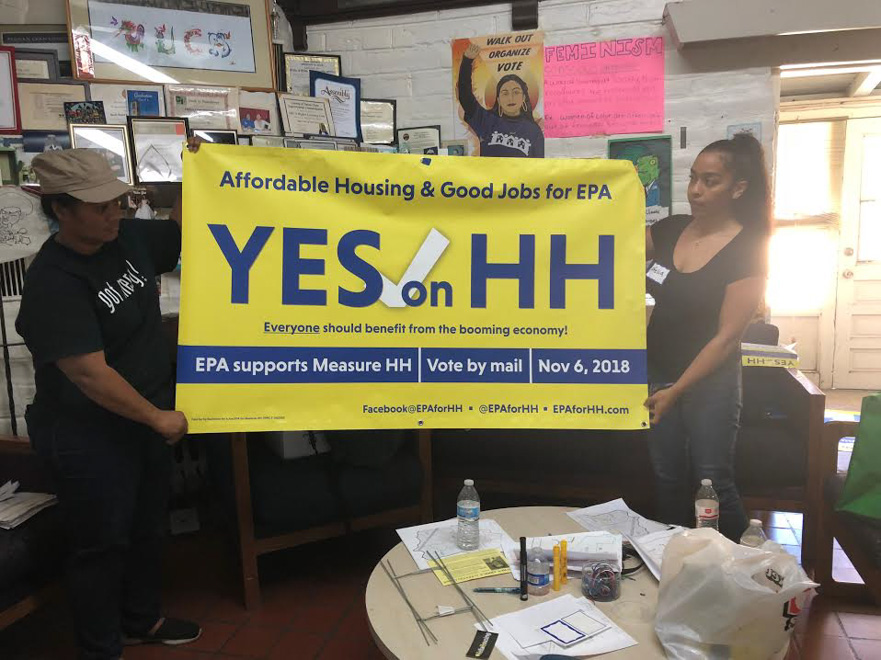After months of campaigning by some in the community, East Palo Alto (EPA) residents voted in favor of Measure HH — a tax on large corporations holding real estate in the city — during last Tuesday’s midterm elections. The tax is projected to raise over $1.67 million for housing and job training in the low-income community. Measure HH received 77 percent approval, well over the two-thirds majority required for the measure to pass, though ballots are still being counted.
The measure will impose a tax of $2.50 per square foot on commercial office property of over 25,000 square feet. According to EPA workers’ rights attorney Scott Hochberg, the City Council is limited to spending tax revenue from Measure HH on three primary projects: building more affordable housing units, implementing job training programs in STEM fields and enforcing a policy, allegedly skirted by Amazon last year, that requires at least 30 percent of people hired at new businesses be local residents.
Amazon and the Four Seasons Hotel in EPA are the two largest holders of commercial real estate in the city, meaning they will be most affected by the tax.
Hochberg said Measure HH was created through a grassroots organizing effort, led by a group of community organizations known as the Envision-Transform-Build EPA Coalition.
“[Envision-Transform-Build] worked for months to lobby the city council to put it on the ballot, and after that for the last four months the coalition ran a campaign in East Palo Alto to educate voters about why we needed this,” Hochberg said.
“The coalition is thrilled with [the approval of the measure],” he added. “We’re just heartened that East Palo Alto could support such an innovative approach to holding tech companies accountable.”
EPA Residents said that, in the early phases of the proposal, the City Council expressed concern over the bill’s potential negative impacts on corporate developers. Proponents of the measure lobbied to communicate potential benefits the tax would bring to the community, which has been increasingly impacted by the gentrifying effects of the Silicon Valley tech industry.
“My involvement was shifting us away from a place of fear to really letting the voters decide what they wanted to happen in our community as it pertains to big development and big tech,” said EPA resident Kyra Brown, who campaigned for Measure HH online, door-to-door and in front of the City Council.
“It was a big step but a beneficial step for the community to pass HH,” Brown added. “That’s not to say the measure is perfect. Measure HH will require staying involved and making sure that there’s accountability on multiple sides.”
EPA is adjacent to Palo Alto and is home to a majority low-income Latinx population. Although EPA is one of the few places left in the Silicon Valley with affordable housing, the city has seen significant demographic shifts and development in recent years.
“Large companies should be the main ones contributing to solving some of the problems that they are exacerbating in East Palo Alto, like rising rents, gentrification and [increasing] levels of traffic,” Hochberg said.
According to Brown, proponents of Measure HH hope to cooperate with the technology industry to find a mutually beneficial strategy that will allow companies to continue innovating while minimizing their negative impacts on the local community.
“A lot of people tend to assume that if one criticizes the tech industry and wants these companies to be socially responsible to the low-income and working-class communities that they choose to expand into, that we are somehow anti-tech — but that’s not the case,” Brown said. “My goal was to show people you can live in Silicon Valley and love technology, yet still hold big tech accountable — the two are not mutually exclusive.”
She referenced efforts to limit tech companies’ footprints in neighboring cities, such as Mountain View’s decision to curb free food at Facebook in order to support local restaurants and San Francisco’s consideration of a similar policy.
“[These efforts] show that the problem involves EPA, but the problem is bigger than EPA,” Brown said. “That was encouraging and gave greater visibility to the struggle of what’s going on in EPA.”
According to Hochberg, Measure HH not only makes a significant statement to tech companies, but also directly impacts them financially, communicating resistance to the gentrifying effects of Silicon Valley businesses.
“Measure HH set the message to large corporations that East Palo Alto isn’t just a vacuum in which they can build their fancy corporate headquarters,” Hochberg said. “If they want to reap the benefits of locating their businesses in the heart of Silicon Valley, they’re going to have to pay their fair share towards helping the whole community thrive.”
The Four Seasons Hotel declined to comment. Amazon has not responded to the Daily’s multiple requests for comment.
Contact Nohemi Davila at nohemi ‘at’ stanford.edu
